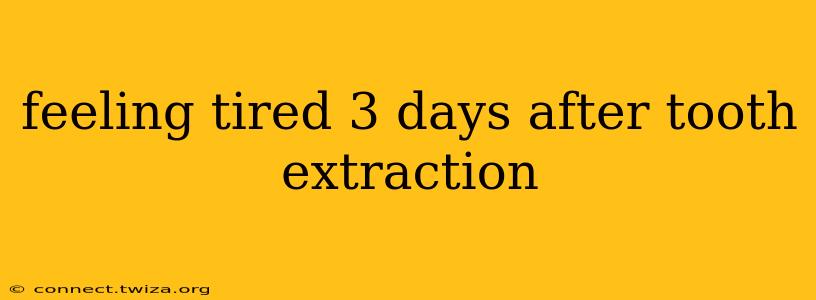Feeling tired three days after a tooth extraction is completely normal. While the immediate pain might subside, your body is still recovering from a surgical procedure. This fatigue isn't just a matter of discomfort; it's a physiological response to the trauma and healing process. Let's delve into why you're feeling tired and what you can do to manage it.
Why Am I So Tired After a Tooth Extraction?
Several factors contribute to post-extraction fatigue:
-
Stress on the Body: Tooth extraction, even a simple one, is a surgical procedure. Your body expends significant energy repairing tissues, combating infection, and managing inflammation. This energy expenditure leads to fatigue.
-
Blood Loss: Even minor bleeding during and after the extraction contributes to fatigue. Loss of blood means a loss of essential oxygen-carrying red blood cells, leaving you feeling weak and tired.
-
Medication: Prescription pain relievers, often opioids or NSAIDs, can cause drowsiness and fatigue as a side effect.
-
Infection: While unlikely if proper post-operative care is followed, infection at the extraction site can lead to significant fatigue and malaise.
-
Poor Nutrition: The pain and discomfort associated with extraction might lead to reduced food intake, resulting in a lack of energy-giving nutrients. This can exacerbate fatigue.
-
Sleep Disruption: Post-operative pain and discomfort can significantly disrupt your sleep patterns, leading to daytime fatigue.
How Long Does Post-Extraction Fatigue Last?
The duration of post-extraction fatigue varies considerably from person to person. Most people experience the most significant fatigue in the first few days, with gradual improvement over the following week or two. However, some individuals may experience lingering fatigue for several weeks. If your fatigue persists beyond three weeks or is accompanied by other concerning symptoms, it's crucial to consult your dentist or oral surgeon.
What Can I Do to Combat Post-Extraction Fatigue?
Managing post-extraction fatigue involves a multifaceted approach:
-
Prioritize Rest: Get plenty of sleep. Your body needs rest to heal effectively. Try to maintain a consistent sleep schedule, even if it means adjusting your routine temporarily.
-
Eat a Nutritious Diet: Focus on nutrient-rich foods that are easy to eat. Soups, smoothies, and soft foods can provide essential vitamins and minerals without causing additional discomfort. Stay hydrated by drinking plenty of water.
-
Manage Pain Effectively: Follow your dentist's instructions regarding pain medication. Don't hesitate to contact them if your pain is poorly controlled.
-
Gentle Exercise: Light exercise, such as short walks, can help improve circulation and energy levels once the initial healing phase passes (consult your dentist before resuming any exercise).
-
Avoid Strenuous Activities: Avoid strenuous physical activity, heavy lifting, and anything that could disrupt the healing process or cause bleeding.
-
Monitor for Infection: Keep a close eye on the extraction site for signs of infection, such as increased pain, swelling, redness, or pus. Contact your dentist immediately if you notice any of these symptoms.
Is it Normal to Feel Tired Several Days After Tooth Extraction?
Yes, feeling tired several days after a tooth extraction is entirely normal. Your body is undergoing a healing process, and fatigue is a common symptom. However, if your fatigue is severe, persistent, or accompanied by other worrying symptoms, seek medical advice.
Are There Any Other Side Effects Besides Fatigue?
Yes, other side effects besides fatigue are common after a tooth extraction. These can include pain, swelling, bleeding, bruising, and numbness in the area surrounding the extraction site. Dry socket (alveolar osteitis) is a complication that can also cause significant pain.
When Should I Call My Dentist?
Contact your dentist immediately if you experience:
- Severe, persistent pain
- Excessive bleeding
- Signs of infection (swelling, redness, pus)
- Fever
- Difficulty breathing or swallowing
Remember, open communication with your dentist is crucial for a smooth recovery. Don't hesitate to contact them with any concerns or questions you may have. Following their post-operative instructions carefully will help ensure a healthy and speedy recovery.
